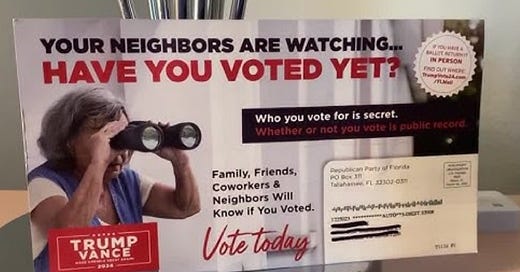Strategies to increase voter turnout have been studied forever. Among the most effective methods are relational — canvassing, door knocking, and phone banking. Among the least effective are impersonal — automated text messaging, for instance.
So the job of a well-oiled campaign is to scale up relationship-building and churn out votes as a result. Clear, but difficult.
The authors of the study I linked above express surprise at one of the effects of this theory: social pressure drives turnout.
Experiments suggest that interventions ratcheting up social pressure by reminding people of their voting histories and those of their neighbors or by mentioning that their participation or lack thereof would be a matter of public record or scholarly investigation are unusually effective. “When social norms are asserted forcefully, the effects tend to be quite large, and even prerecorded phone calls conveying social pressure messages significantly increase turnout” (Green et al. 2012, p. 10). Still, threatening to publicly expose voting slackers is unlikely to be adopted as a tactic on any significant scale by either partisan or nonpartisan mobilization campaigns.
We are seeing ads to this effect, though; I’ll leave it to you to decide whether this would influence your turnout:
But for those of us in college: are we really that surprised? Social pressure is the oxygen of the college ecosystem. We act when others do the same — how we dress, who we talk to, what classes we take, which parties we go to.
For you Dukies who haven’t voted yet, here are some facts:
Thousands of Duke students have voted already. Multiple Cameron Indoor Stadium student sections. Multiple Central Campus party zones.
Early voting ended yesterday, but you haven’t missed out just yet. You have one more chance to be in the know, on Tuesday — from 6:30am-7:30pm.
For West Campus folks: Patterson Recreation Center (2614 Crest St, Durham, NC 27705)
For East Campus folks: George Watts Elementary School (700 Watts St, Durham, NC 27701)
There will be organized driving to these locations. Don’t miss out! The Durham vote stickers are awesome too (they say: no bull, I voted).
Go vote, and bring your crush or something while you’re at it.
If you’re waiting in line on election day and need a quick brief about why some of the positions below the President make a difference, here’s a two-minute explainer.
how did we get here
In 2010, the NC State House and Senate (the two branches of the General Assembly, in charge of legislative policymaking) won majority Republican control, a first in a century.
The GA used this control to redraw their districts and effectively choose which voters to represent (called gerrymandering), a direct perversion of democracy. They now have a supermajority, allowing them to pass bills even against the wishes of the Governor.
They passed a statewide abortion ban at 12 weeks, which created a horrific chilling effect across the state — overriding the veto from (Democrat) Governor Cooper. Patients fear asking for the procedure, and doctors fear delivering it. In states like NC with gestational bans, OB-GYN applications dropped 6.4%. This is a state that already sees a quarter of counties without a single OB-GYN. Childbearers across the state are endangered, to put it mildly. Their partners, dads, and sons will experience the consequences too.
The GA has also passed legislation cutting funding to public education, undercutting labor unions, relaxing gun regulations, enabling environmental degradation, and banning gender-affirming healthcare for trans youth.
Further, the State Supreme Court currently claims a Republican majority, greenlighting many of the more legally dubious policies pushed through the General Assembly.
here’s more detail
There are consequential races all the way down the ballot this year in North Carolina. Most important: breaking the General Assembly Republican supermajority, keeping the Governorship blue, and cutting into the State Supreme Court Republican majority.
Governorship:
The NC governorship is more ceremonial than many states, but its veto power against GA laws is more important than ever, with the GA supermajority hanging in the balance (a supermajority allows vetoes to be overridden).
Mark Robinson, the Republican candidate, has called himself a Black Nazi. He’s said about abortion, “It's about killing the child because you weren't responsible enough to keep your skirt down.” Nuff said.
Lieutenant Governor:
The LG assumes the governor’s responsibility in certain instances (out-of-state travel, incapacitation). So all the same reasons as above to vote blue.
Attorney General / State Supreme Court:
The AG is the state’s representative when sued, or when suing. The State Supreme Court is the highest court in the state, and they have the jurisdiction to restrain the power of the state legislature in particular (for instance, striking down egregious gerrymanders). These are partisan, elected positions — and they are on the ballot.
State Auditor / NC Treasurer:
You might assume these positions are bureaucratic and ceremonial. The two Republican candidates, Dave Boliek and Brad Briner, are current members of the UNC Board of Trustees. This group is responsible for the gutting of diversity, equity, and inclusion funding at UNC-Chapel Hill. And in fact, the state auditor in particular would have the jurisdiction to audit the money flowing into UNC. The group also denied tenure to esteemed scholar Nikole Hannah-Jones, who played an important role in the 1619 project on slavery. Both decisions broke with established precedents and norms. Really, assertions that these positions have historically been bureaucratic and nonpartisan are quite meaningless.
I’ll leave it at this. You have the whole day on Tuesday! Go vote!





